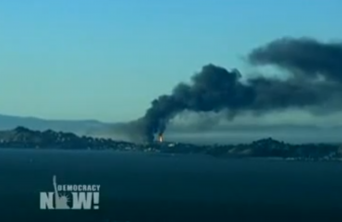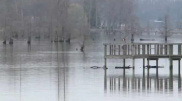Chevron Criticised For Richmond Oil Refinery Fire Response
What started as a small leak at a Chevron oil refinery plant Monday night turned into a into nightmarish blaze, pouring black smoke into the air and sending hundreds to area hospitals with health complaints.
The plant is in Richmond, Calif., situated just north of San Francisco, and has a daily production rate of about 150,000 barrels of gasoline. That amounts to 16 percent of what that region consumes every day.
Residents in the surrounding areas were warned to stay inside and block any cracks in doorways and windows from the unknown smoke that darkened skies. The advice came too late for many as it was reported that at least 900 locals flocked to hospitals with health complaints related to the fire.
As of Wednesday, air toxins were reported as being below harmful levels. Eric Stevenson, the Bay Area Air Quality Management District director of technical services, said more tests are being conducted as many have flocked to hospitals with various symptoms after the incident.
"People were feeling something. We're not saying nothing was out there," Stevenson told Mercury News. "That's what we're trying to ascertain today, with additional analysis."
Hundreds attended a town hall meeting on Tuesday night, calling for Chevron's accountability. Nigel Hearne, refinery manager for Chevron Richmond, was repeatedly booed by the crowd as he tried apologizing for response complaints from local residents, including what many described as a delayed warning system and excessive pollution.
"We take a lot of pride in our environmental performance," said Hearne. "Last night, I can't say I'm proud of that performance."
Andres Soto, an organizer for the Richmond branch of Communities for a Better Environment, told Democracy Now that Chevron continues to shirk from sustainable practices.
"They refuse to sit at the table, they refuse to negotiate in good faith with the community over a wide range of issues, whether it's fair taxation or whether it's environmental safety and environmental justice," Soto said.
WATCH:






